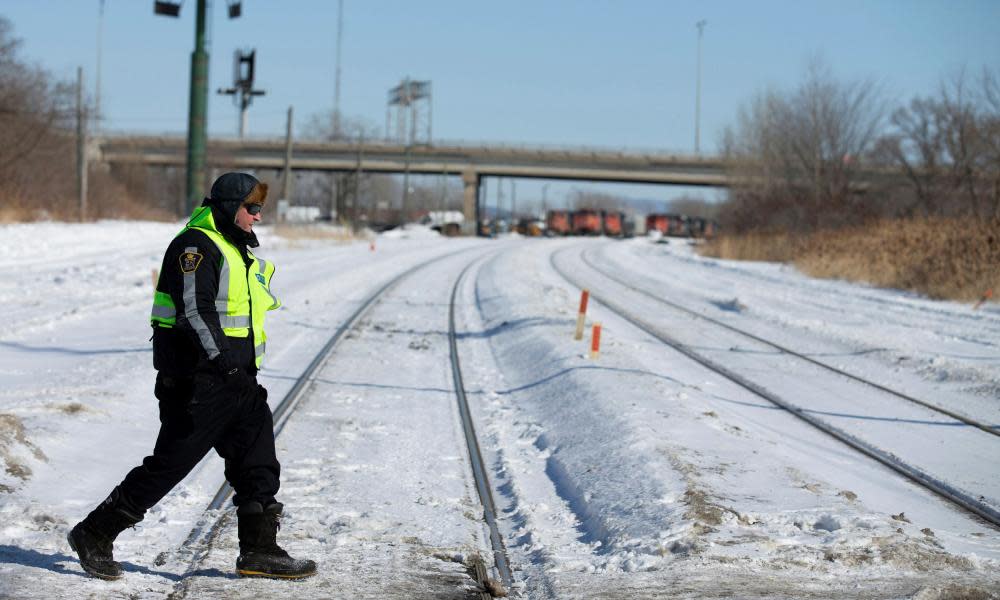Canadian police had 'no authority' to search pipeline activists, says watchdog

Canadian federal police had “no legal authority” to make ID checks and searches on activists seeking to block a pipeline project on Indigenous territory, according to newly released correspondence from the force’s oversight body.
The nine-page letter written by Michelaine Lahaie, chair of the Civilian Review and Complaints Commission for the RCMP, offers scathing criticism of the police’s continued use of tactics against Indigenous people which she had previously warned against.
The document was released as Justin Trudeau’s government struggles to deal with a growing protest movement in support of the Wet’suwet’en nation’s fight against a controversial natural gas pipeline in British Columbia.
Related: Canada: protests go mainstream as support for Wet'suwet'en pipeline fight widens
In recent weeks, demonstrations have sprung up across the country, blockading major railway lines and obstructing access to ports and government buildings.
On Thursday, Canada’s largest rail operator, CN Rail, obtained a court injunction giving it permission to remove a blockade in St-Lambert, a suburb of Montreal.
Quebec’s premier, François Legault, promised swift police-backed action to remove the protest, which since Wednesday has prevented trains from traveling between Montreal and eastern Canada, as well as the US.
Separately, Canada’s public safety minister Bill Blair said that the RCMP in British Columbia had agreed to leave the Wet’suwet’en territory.
But Molly Wickham, the spokeswoman for the Gidimt’en clan in the Wet’suwet’en Nation, said that the RCMP had not yet vacated their territory.
The Wet’suwet’en nation have lived on their territories in what is now British Columbia for thousands of years. They have never signed treaties or sold their land to Canada.
With a population of about 5,000, the Wet’suwet’en are composed of five clans (Gilseyhu, Likhts’amisyu, Laksilyu, Tsayu and Gidimt’en), which are further divided into 13 house groups, each with its own distinct territories.
The Unist’ot’en, the People of the Headwaters, belong to the Gilseyhu clan.
Hereditary chiefs are responsible for the health and sustainability of their house group territories, and Wet’suwet’en law prohibits trespass on the territory of other the house groups.
Wet’suwet’en people have retained their legal traditions and continue to govern themselves through the Bahtlats (feast hall), where decisions are ratified and clan business is conducted.
Speaking to reporters, Wickham said Blair’s comments were part of a “media strategy” to defuse the coast-to-coast protest movement along the nation’s rail lines that has led to major economic losses and layoffs.
Not all First Nations and clans are opposed to the pipeline. A number of others have signed agreements with the company behind the pipeline, Coastal GasLink, but the pipeline does not have the blessing of the Wet’suwet’en hereditary chiefs, and for months activists blocked pipeline workers’ access to the construction site.
Earlier this month, the RCMP enforced a court injunction allowing them access, but their tactics have ignited broad criticism, and in January the BC Civil Liberties Association, the Wet’suwet’en hereditary chiefs and the Union of BC Indian Chiefs filed a joint complaint to the CCRC.
According to the complaint, police created a large exclusion zone which it used to deny access to people including Nation members, media and legal counsel. Other witnesses said the police kept them at a checkpoint for hours in -37C weather while they were trying to deliver food and emergency supplies. The police have conducted raids and arrested activists.
Lahaie’s note is not an official report from the CRCC. In fact, the chair said she was not opening an official inquiry, because previous recommendations she made after 2013 Indigenous anti-shale protests in New Brunswick also applied to the Wet’suwet’en complaint. That report, completed in 2019, has not yet been made public.
However, Lahaie’s correspondence with the Wet’suwet’en – which was released by the complainants – said that while some elements of the RCMP’s behaviour were reasonable, ID checks, searches and restricting access to the territory were not.
Speaking at a press conference in Vancouver, judge Mary Ellen Turpel-Lafond, and Harsha Walia from the BC Civil Liberties Association, noted that the RCMP has been aware of Lahaie’s findings for more than a year and still behaved unlawfully in Wet’suwet’en.
“This letter suggests that there’s a very serious problem that the civilian oversight of the RCMP does not work,” said Turpel-Lafond.
The Highway of Tears – a lonesome stretch of highway along which unknown numbers of hitchhiking Indigenous women have gone missing – passes near Wet’suwet’en territory.
Last year, a federal inquiry on the issue heavily criticized the RCMP for its failures to take the issue seriously.
Turpel-Lafond said the Wet’suwet’en crisis had exposed a fundamental problem at the heart of Canada’s approach to missing and murdered Indigenous women and girls.
“Canada’s oversight of policing is clearly inadequate for First Nations. Even the commissioner is essentially saying to us, ‘I’m impotent to deal with this. Help me to get the RCMP to respond.’ That’s a very sad statement about the state of policing,” she said.

